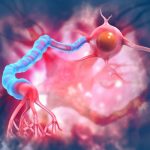Dr Yuan Zhou is a postdoctoral research fellow funded by MS Research Australia at the Menzies Institute for Medical Research, University of Tasmania, whose work focuses on the genetics of MS.
Dr Zhou was recently selected as part of an incredibly competitive, international process through the Australian Academy of Science as one of eight rising stars of Australian science to attend the 68th Lindau Nobel Laureate meeting in Germany dedicated to physiology and medicine. This is a highly prestigious annual gathering of Nobel Laureates and talented young scientists from around the world.
This recognition is a testament to Dr Zhou’s great potential as a young MS researcher and has given him a once-in-a-lifetime opportunity – many Lindau alumni have become highly successful scientists, with one going on to win a Nobel Prize themselves.
Dr Zhou told us about his amazing experience in Lindau and how the Nobel winning scientists have inspired him in his own career and fuelled his research ideas.
“The week at Lindau was one of the most amazing moments in my life that will shape my future”, said Dr Zhou. “Educate, Inspire and Connect is the theme of the meeting. Never in any other occasion will I have the opportunity to be educated by 39 master Nobel Laureates who have made ground-breaking discoveries that greatly benefit the health of human beings. The open-minded conversions not only helped broaden my way of thinking but, more importantly, influenced my future research direction. For example, Harald zur Hausen was awarded the Nobel Prize for the discovery of the human papillomavirus. His team recently discovered several novel circular DNA molecules that have been identified in another neurological disorder, in MS brain tissues. If validated, the findings may change our understanding of MS as an autoimmune disease and is something I should like to investigate in my own work.”
“The Noble Laureates, these most innovative scientists, were once called young scientists themselves. They had failed and been rejected many times and some were even dismissed as their research was not in line with mainstream concepts, many of which were later proved wrong. What I found most inspiring is their curiosity, the willingness to take a chance on and trust in their ideas. They ultimately answer to themselves and the truth, not to a crowd or committee, and this attitude is one I shall aim to emulate.”
Now, having been so fortunate to attend this meeting, I am a Lindau alumnus which will enable me lifelong access to this global elite science network. This will be a priceless resource for my future career development and my research. Nothing is to be feared, it is only to be understood. There are exciting works to be done in the near future that will benefit people with MS. I would specifically like to thank MS Research Australia for the generous support to continue my research.”
After the meeting, Dr Zhou also visited several sites in Munich, which included the Munich Center for NeuroScience, Gene Centre Munich, the Helmholtz Neurogenetics Institute, the IBM Watson Head Quarters and the prestigious Max Planck Institute of Psychiatry. During these visits, Dr Zhou found further inspiration and learnings and in particular gained insights from the directors that will greatly benefit the plans to establish the Tasmania MS Translational Research Centre at the Menzies Institute for Medical Research. The Centre will focus on bringing clinical, epidemiological, genetics, health economics and laboratory streams of research together in a targeted translational program to accelerate the implementation of novel discoveries.
Dr Zhou’s trip to Germany was supported by Australian Academy of Science and the Science and Industry Endowment Fund.






